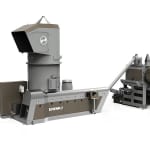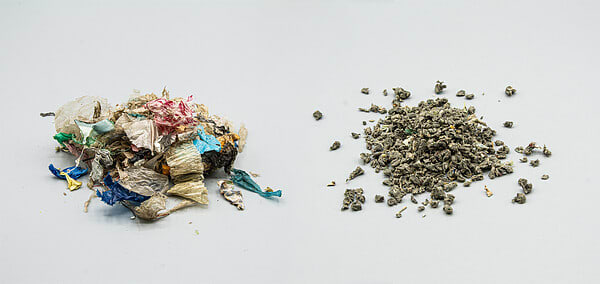
Erema will present Agglorema at K 2025, a generation of recycling machines designed to prepare heavily contaminated post-consumer waste for downstream processing, particularly chemical recycling. The system converts film rejects and other low bulk density materials with fluctuating moisture into pourable agglomerates with high bulk density. "It is our job to build machines that support chemical recyclers in the recovery of low-grade waste fractions," says Klaus Lederer, Business Development Manager Chemical Recycling at Erema. Many chemical recycling plants require standardised, pourable input. "Agglorema closes the gap between highly contaminated, heterogeneous and often thin-film waste streams, and reliable feedstock for the reactor. This is a particularly robust and energy-efficient system," adds Lederer. The new series complements the company’s portfolio for chemical recycling and aligns with Chemarema.
Agglorema is engineered for waste streams with low bulk density, from 30 kg/m³, and moisture contents of up to 12 percent. Stability is achieved by combining the Erema preconditioning unit, PCU, with patented Counter Current technology and a specially designed extruder screw. Even when the feed varies in polymer type, geometry or moisture, this setup homogenises, degasses and preheats the material, then continuously feeds it into a short extruder without upstream drying. According to Erema, conventional agglomeration systems reach their limits when bulk density is low or input parameters fluctuate, whereas the PCU and the robust system layout are designed to cope with these conditions. The concept is scalable and, depending on configuration, handles up to 2.3 tonnes per hour with headroom for further increases in throughput.
Process concept and input tolerance
From the extruder, the partially melted strand is directed through a melt pipe to a water-cooled melt mill. There, the material is formed into agglomerates with bulk densities in the range of 280 to 380 kg/m³. Optional downstream drying, depending on the line setup, can reduce residual moisture to below one percent. The layout is deliberately straightforward and robust. It leverages the advantages of extrusion while significantly lowering process temperature and energy demand. "Our specially designed extrusion technology only inputs as much energy as the material requires," says Klaus Lederer.

The new Agglorema system from Erema processes heavily contaminated plastic waste on a large scale to produce pourable agglomerates with a high bulk density that is ideally suited as feedstock for chemical recycling.
Applications and trade fair presence
The Agglorema line prepares feedstock for chemical recycling and can also be used in mechanical recycling. Agglomerates from mixed polyolefin fractions can be processed into simple components.
Visitors can learn more at K 2025, Hall 9, stand C09, and at the Edvanced Recycling Centre in the outdoor area, CE03.

K 2025 sees Erema launch the Agglorema generation of machines, a new recycling system specially developed for processing heavily contaminated post-consumer waste.



